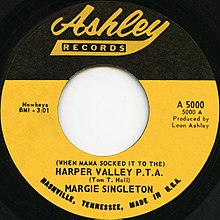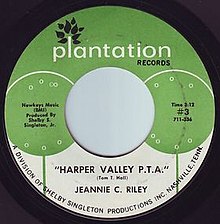Harper Valley PTA
Harper Valley PTA a song composed by Tom T. Hall , which in 1968, in the version by Jeannie C. Riley, became one of the greatest crossover successes in pop and country music history. The play tells of an encounter between a single widow and the parents' council of her child's school, whose members criticize their dealings with men and who in the end are exposed themselves.
History of origin
Country singer Margie Singleton was the divorced wife of record producer Shelby Singleton and has been releasing country records since 1957. She asked the producer and composer Tom T. Hall for a song that should be based on Ode to Billy Joe . When Hall drove past Harpeth Valley Elementary School in Bellevue, Tennessee , he remembered the name and wrote the song about the single mother in July 1968. According to author Fred Bronson, it is an actual confrontation between the "morally impeccable" PTA and a "suspicious" mother. The acronym PTA stands for Parent Teacher Association, a parents' council that aims to improve school conditions and communication between parents and teachers, especially in small towns in the USA.
Margie Singleton recorded the song in early July 1968 in Nashville as a single (Ashley # 5000). It also appeared on the LP Margie Singleton's Harper Valley PTA (Pickwick SPC 3133), released in August 1968.
Successful cover version
Shelby Singleton found out about his ex-wife's single and secured the rights to Riley's cover version , which was initially to appear on Aubrey Mayhew's "Little Darlin '" label. Singleton booked a recording date for Riley and another singer named Royce Clark for July 26, 1968 at Columbia Recording Studios in Nashville; Singleton wasn't sure if Riley's vocal skills would be enough. The result was Harper Valley PTA / Yesterday and All Day Long Today , produced by Shelby Singleton and sung by Jeannie C. Riley. Producer friend Jerry Kennedy played Dobro during the sparsely orchestrated recording session . The day after, Singleton went with the master tape to the influential radio DJ Ralph Emery from WSM in Nashville , who played the A-side several times at the request of the listeners.
As the young label's third single, the title was marketed in August 1968 as Plantation # PL3. At the time, Jeannie C. Riley still believed that the song was not “country enough” to establish her as a country singer. Just two weeks after publication, 1.75 million copies had been sold, four million in the USA alone and over six million worldwide. The song first made it into the pop hit parade on August 24, 1968 , where it stayed at number one for a week. On August 31, 1968, he also came into the country charts, which noted him in first place for three weeks. This made it the most successful crossover hit of the time. Riley was also the first woman to top both country and pop music charts with the same song. The song earned a BMI award . The title was also awarded a Grammy .
Riley was shaped by this song because everyone wanted to see her in that confident image that the song described and that she rejected. The sudden fame affected their marriage, and she divorced Mickey Riley in 1970. Jeannie C. Riley also named her 1980 autobiography From Harper Valley to the Mountain Top .
text
The text follows the biblical quotation “Do not judge that you may not be judged” (Matthew 7: 1). Single widow Stella Johnson's daughter is attending junior high in Harper Valley, where conservative standards of behavior apply. The daughter brings home a letter written by the parents' council accusing the mother of wearing skirts that are too short and hanging out with men while drunk.
The mother then uses a parents' meeting to denounce other parents. Bobby Taylor has asked her to meet seven times and his wife needs lots of ice cream when her husband is gone; Mr. Baker could certainly explain why his secretary had to leave the place; Widow Jones should better keep her curtains closed; Mr. Harper couldn't be there now because he'd been in the pub too late yesterday, and Shirley Thompson smelled of gin again. At the end, the daughter has her say: "... that was the day my mom showed it to the school" - with a final crescendo . The song also quotes the then popular daily soap Peyton Place , in which similar secrets were revealed.
Continuation, cover versions and film adaptations
Following the success of Harper Valley PTA , Hall wrote a two-part follow-up song in November 1968, The Continuing Story of Harper Valley PTA , which was recorded by country singer Dee Mullins .
Harper Valley PTA has been covered by numerous covers by Dolly Parton , Loretta Lynn , Billie Jo Spears , Martina McBride , Dottie West and Billy Ray Cyrus , among others .
The play was also the template for a television movie that NBC aired on February 24, 1980. The premiere of the film of the same name took place on January 16, 1981. In both works, Barbara Eden played the main character of the song, Stella Johnson.
Individual evidence
- ↑ not far from Franklin , where he lived at the time
- ^ Fred Bronson, The Book of Billboard Number One Hits , 1985, p. 246.
- ↑ Billboard Magazine, September 28, 1968, p. 30.
- ↑ James C. Hefley, Country Music Comin 'Home , 1992, p. 113.
- ^ A b Joseph Murrells, Million Selling Records , 1985, p. 269.
- ↑ Harper Valley PTA ( page no longer available , search in web archives ) Info: The link was automatically marked as defective. Please check the link according to the instructions and then remove this notice. BMI entry
- ↑ James C. Hefley, Country Music Comin 'Home , 1992, p. 115.

